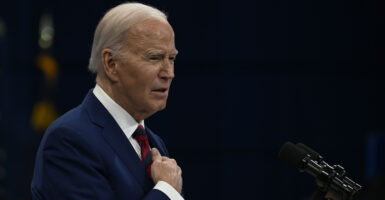After delivering his State of the Union speech in the House chamber by invitation earlier this month, President Joe Biden received a less savory invitation Thursday—to testify in the House’s impeachment investigation of suspected influence peddling by the president and his family.
House Oversight and Accountability Chairman James Comer, R-Ky., announced the invitation to Biden just before Easter weekend. Comer’s committee is conducting the impeachment investigation jointly with both the Judiciary and the Ways and Means committees.
“The committee has accounted for over $24 million that has flowed from foreign sources to you, your family, and their business associates,” Comer said in his letter to Biden.
“The committee has identified no legitimate services to merit such lucrative payments,” the Kentucky Republican wrote. “You have repeatedly denied playing any role in your family’s business activities, but the committee has amassed evidence—including bank records and witness testimony—that wholly contradicts your position on these matters.”
The president’s son, Hunter Biden, and the president’s brother, Jim Biden, both gave depositions to investigators as well as members of the committees.
Comer’s letter to Biden continues:
Additionally, the White House has taken a position hostile to the committee’s investigation and refuses to release certain information or make available witnesses to testify regarding issues relevant to the ongoing impeachment inquiry currently authorized by the full House of Representatives.
In light of the yawning gap between your public statements and the evidence assembled by the committee as well as the White House’s obstruction, it is in the best interest of the American people for you to answer questions from members of Congress directly, and I hereby invite you to do so.
Ian Sams, adviser to the White House counsel, mocked the invitation in a tweet, telling House Republicans that they have failed in their effort to impeach the president.
Although congressional committees have subpoena power to compel witnesses to testify, including executive branch officials, it’s not likely that such a panel could compel a president to testify. The move would bring up issues related to the constitutional separation of powers.
However, a president can accept an invitation to answer questions. For example, during the 1998 impeachment inquiry, President Bill Clinton answered questions in writing from the House Judiciary Committee before he was impeached on charges of perjury and obstruction of justice.
Comer’s Oversight Committee found that Biden family members received $15 million from business dealings in China, Ukraine, Russia, Kazakhstan, and Romania.
The panel traced $40,000 from the China-linked energy conglomerate CEFC China Energy that ended up in Joe Biden’s bank account. Separately, it found a $200,000 payment linked to a health care company.
Both checks were written by Jim Biden with the note “loan repayment” when his older brother, a U.S. senator for four decades, was out of office as vice president but before he became president.
Devon Archer and other former Biden business associates testified to the committee that Joe Biden participated in business meetings and conference calls.
“The public is left with two irreconcilable narratives. The first—asserted by you—is that you did not engage in influence peddling in exchange for payments to your family,” Comer wrote to the president. “The second—asserted by witnesses and a body of evidence I will briefly review below—is that you were indeed involved in these pay-for-influence schemes and that you have been repeatedly untruthful regarding a matter relevant to national security and your own fitness to serve as president of the United States.”

























